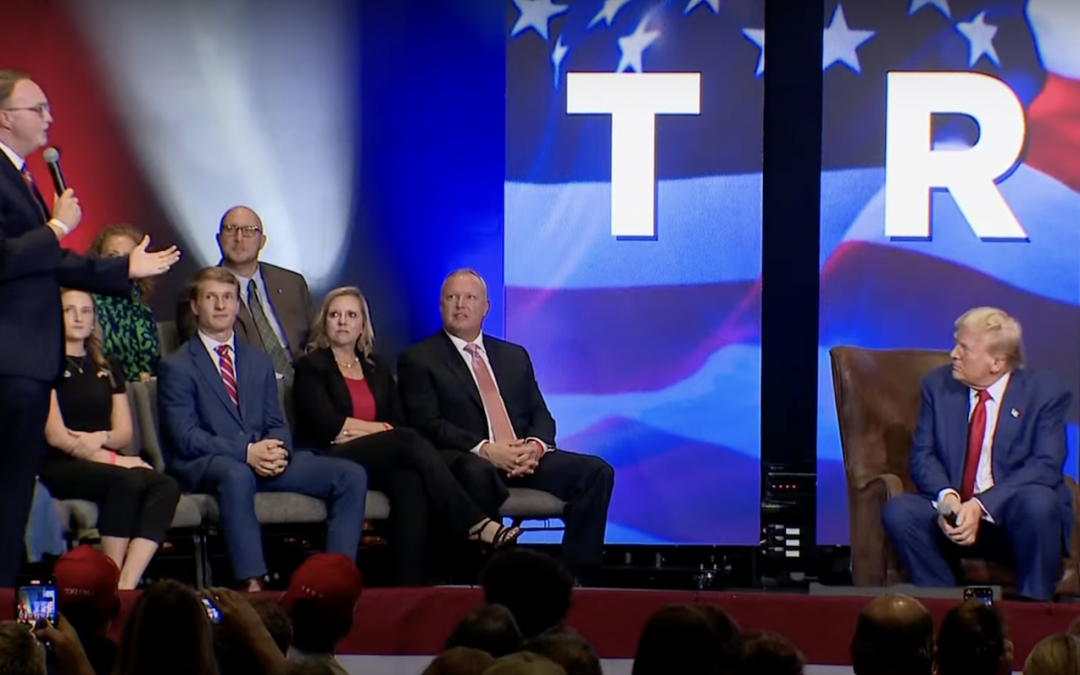WASHINGTON — With less than two weeks until election day, former President Donald Trump doubled down on his efforts to court religious voters on Wednesday, holding a “Believers and Ballots” town hall where he urged Evangelicals to vote.
At the event in Zebulon, Ga., Trump took limited questions but claimed that “Catholics are being persecuted” in the U.S. by “vicious people.” He was introduced by Ralph Reed, the founder of the conservative Christian advocacy Faith and Freedom Coalition.
“It is time to return to the biblical principles upon which this nation was founded,” Reed said. “It is time for Christians to be the head, and not the tail, of our political system.”
To carry the Peach State, Trump will need to run up the score in rural and heavily-religious areas to offset large Democratic margins in the more secular urban and suburban counties.
Trump has frequented various conservative Christian venues on the campaign trail. In June, he spoke for more than an hour at aFaith and Freedom Coalition conference in Washington, D.C.
“This year you will knock on 10 million doors, reach 18 million Christian voters, and register 1 million new voters across 130,000 churches,” Trump said at the conference. “You should put [ballot drop boxes] in your churches because, you know, the evangelicals and the Christians, they don’t vote as much as they should.”
An April poll by the Pew Research Center between Trump and then-presumptive nominee Joe Biden, found that observant Christians who frequently attended church favored Trump by a 27-point margin.
In neighboring South Carolina, televangelist pastor and Trump ally Mark Burns is working to shore up religious support for the former president.
“It’s a sad day in America when Democrats are openly rejecting the name of Jesus, in a nation that was founded on Judeo-Christian principles,” Burns told the Medill News Service, referring to an incident in which hecklers shouted “Jesus is lord” at Vice President Kamala Harris, who responded that they were at the “wrong rally.”
A prominent voice among the religious right, Burns had previously spoken at the 2016 Republican National Convention, declaring that “we are electing in Donald Trump a man who believes in the name of Jesus Christ.”
He was described that year by Time magazine as “Donald Trump’s top pastor,” and would go on to run for the U.S. House of Representatives three times: in 2018, 2022, and 2024, narrowly losing the 2024 primary despite Trump’s endorsement.
When asked whether Trump’s history of extramarital affairs and the allegations of sexual harassment and assault against him called into question his religious bonafides, Burns rejected the premise.
“It is perplexing when people start to bring up Donald Trump’s past and his past failures as a husband, or allegations that have come against him, that may or may not even be true,” he said. “But people bring that up as though that disqualifies him for being the man that God has chosen in this season.”
In 2023, Trump was found liable by a jury for sexual abuse of E. Jean Carroll.
Burns continued that “David was an adulteress and a murderer, and yet God still used him to unify Israel and to begin the Messiah through his lineage.”
Trump has touted his support for Israel itself as evidence of his faith, saying in Zebulon that “Evangelicals and so many people support Israel,” and adding that “nobody has done what I’ve done for Israel.”
American Evangelicals have long been a pro-Israel voting bloc, with a June 2024 survey by the Chicago Council on Global Affairs finding that the group is highly supportive of Israel’s war in Gaza, as many attribute the nation’s existence to divine intervention.
Burns said that while he opposes government action that would limit the ability of citizens to practice their own religions, Christian policies should play a role in another Trump administration.
“I think that when you understand the term ‘separation of church of state’ and what the founders meant when they said it, it was making sure that the government did not intervene with the church,” Burns said. “It was not designed to keep the church out of the government.”

